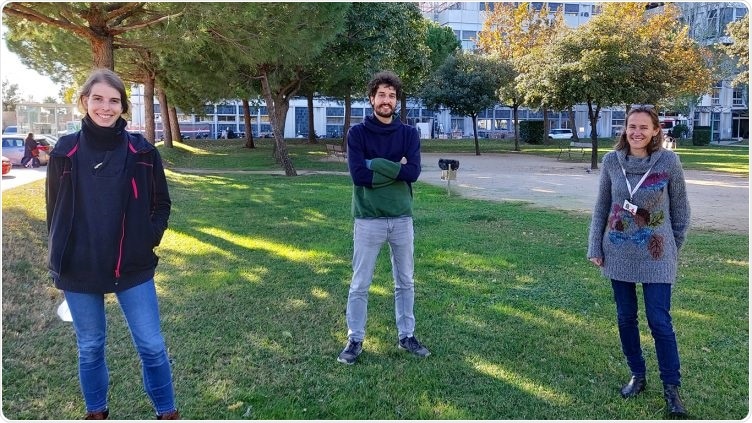Although immunotherapy has been effective in treating different kinds of cancer, like melanoma or lung, it is still unsuccessful when it comes to treating breast cancers and is considered as being “cold,” with poor infiltration of immune cells.

From left to right, Clara Gómez-Aleza, Guillermo Yoldi, and Eva González-Suárez. Image Credit: Bellvitge Institute for Biomedical Research (IDIBELL).
Tumors evade immune surveillance by using various strategies—by attracting immunosuppressive cells or by decreasing the infiltration of cells that may attack them. Such strategies can play a role in the poor prognosis seen in breast cancer of young women and render them insensitive to immunotherapy.
Because of this reason, identifying a treatment that could transform immunologically “cold” tumors—in which immunotherapy is ineffective—into “warm” tumors would indicate a significant step to improve the efficacy of immunological treatments for breast cancer, since these therapies are based on immune cell reactivation to target the tumor cells.
In an article recently published in the Nature Communications journal, the Transformation and Metastasis Group headed by Eva Gonzalez-Suarez, first from the Bellvitge Institute for Biomedical Research (IDIBELL) and now at the Spanish National Cancer Research Center (CNIO), has proposed RANK signaling pathway as a major candidate to modulate the immune response in breast tumors.
In association with Christos Sotiriou from the Jules Bordet Institute in Belgium, the immunomodulatory activity of the RANK pathway has also been validated in a clinical trial with premenopausal patients suffering from luminal breast cancer—one of the most resistant forms of immunotherapy.
According to the study, the suppression of the RANK protein supports the recruitment of immune cells inside the tumor in mouse models and also in breast cancer patients. Additionally, tumors seem more responsive to immunotherapy following the inhibition of the RANK pathway in tumor cells.
These findings indicate that this protein plays a key role in the interaction between immune and tumor cells. They also indicate that the RANK pathway is a potential escape route of cancer cells against immunotherapy.
Christos Sotiriou headed a clinical trial that involved premenopausal patients with early-stage breast cancer. The trial demonstrated that patients tolerated the infection of a monoclonal antibody that blocks the RANK pathway and achieved good outcomes. This helped improve the infiltration of immune cells in tumors and detect biomarkers that could help choose patients who would gain from this therapy.
The significance of this study lies in the fact those two separate studies—a preclinical study and clinical trial—conclude that the inhibition of RANK signaling improves the antitumor immune response.
The monoclonal antibody being tested in this study is used routinely for the treatment of bone diseases such as osteoporosis and bone metastases, but not for cancer treatment. Our results support the use of this antibody in combination with immunotherapy against breast cancer. This strategy could turn immunologically cold breast cancers into tumors sensitive to the immune system activity.”
Eva Gonzalez-Suarez, Bellvitge Institute for Biomedical Research
Tumor immune surveillance
The immune system—which detects foreign microbes, bacteria, and viruses, and offers a response to kill these disease-causing agents—plays an analogous role in shielding the body from malignancies. Abnormal proteins expressed by cancer cells can be detected by immune cells since they function as tags that enable the immune system to identify and kill those cells.
The existence of immune cells inside the tumor—the supposed immune infiltration—is linked with a good prognosis. But tumors also have mechanisms that enable them to evade the immune responses that usually prevent the formation of malignant tumors. This implies that immunotherapy is yet to become fully effective in treating different kinds of cancer.
Research works like the one recently published by IDIBELL and CNIO help enhance this potential approach for cancer treatments.
Source:
Journal reference:
Gómez-Aleza, C., et al. (2020) Inhibition of RANK signaling in breast cancer induces an anti-tumor immune response orchestrated by CD8+ T cells. Nature Communications. doi.org/10.1038/s41467-020-20138-8.